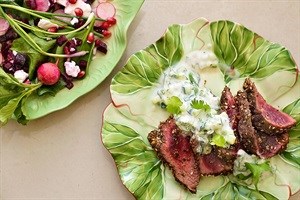
Top stories






More news














This is not to say that we shouldn't allow ourselves to indulge a little, but allow for eating in moderation and maintaining a varied diet. Ditching your weight loss or weight management plans, or letting go of your health conscious habits over the festive season stresses both body and mind. Of course, you want to enjoy yourself, and it’s certainly not the time to feel deprived, but you can avoid the holidays becoming an extended binge by using strategies to moderate the inevitable excesses.
We asked a team of registered dietitians from ADSA (Association for Dietetics in South Africa) to give us their top tips on how to balance holiday fun with staying healthy, and here’s what they have to say:
Surviving holiday parties: Don’t attend a party on an empty stomach – grab a small healthy snack before you go. When you get there, don’t rush to eat – socialize and settle into the festivities before you eat and keep your socializing away from the buffet table or appetizer trays – to help limit nibbling. (Cheryl Meyer)
Eat mindfully: The buffet table is an invitation to eat all you can, so first survey what is available, choose the foods you really want to eat, and then move away. Eat slowly, focusing on enjoying the taste and smell of each bite. (Jessica Byrne)
Eat what you love, leave what you like. Be picky – don’t deny indulges, but only eat treats that you really love – avoid “wasting” calories on non-favourites. Think quality rather than quantity. (Cheryl Meyer)
Make water your MVP (most valuable player) this holiday season: Jazz it up with lemon, cucumber or even fruit cubes like watermelon ice cubes, adding an element of holiday indulgence to plain water. Also try plain fruit or herbal tea for a change. Water and tea can help fill you up preventing holiday overeating or even overindulging in alcohol or fizzy drinks, both loaded with calories/ energy. (Hlanzeka Mpanza)
Balance less healthy meals with healthy ones: Choose only one less healthy item or meal per day. For example: one day an English breakfast, the next day an ice cream and the next day a take away, but not all three on one day. Ensure the other meals are healthy by eating lots of fresh vegetables and fruit. (Zelda Ackerman)
Be a snack smuggler: Travelling, shopping and lack of routine during the holidays can lead to skipping meals, or grabbing that seemingly convenient fast food. To keep your appetite in check, never leave home without a snack. Fruit makes a refreshing and no fuss snack, and a small packet of unsalted nuts can easily fit in your handbag for when the hunger hits. (Jessica Byrne)
Avoid after-dinner nibbles and snacks: Those chocolates and biscuits that come out after an indulgent lunch or dinner are unnecessary calories and will probably only make you feel more uncomfortably full. (Lila Bruk)
Have your cake and eat it too: If you do have one of the many sweet treats on offer, keep your portion size as small as possible and choose the healthiest of what you can find. For example, generally fruit-based cakes and desserts are better choices, so an apple tart would be a better option than a chocolate cake, especially if you don’t eat all the pastry. (Lila Bruk)
Start your day with a wholesome breakfast: Have a low GI breakfast such as oats, wholegrain cereal or wholewheat toast with avocado or eggs. This will not only keep you satisfied, your sugar levels stable and hunger pains at bay, but will also prevent you from snacking on sugary treats that are empty calories with little nutrients. (Lucinda Lourens)
Get moving with friends and family: Spend quality time with friends and family these holidays, but instead of catching up over coffee and cake, make the most of the warm weather and plan to do something where you can be active together. Meet for a walk on the beach or get a group together and go for a hike. Go for a swim, or get the whole family involved in a post-lunch stroll around the neighbourhood. (Jessica Byrne)

This ADSA NutritionConfidence recipe, created by Chef Vanessa Marx, is perfect for keeping your health on track this holiday, while still indulging in delicious festive food: “Grilled Ostrich Fillet with Egyptian Dukkah and Cucumber Raita”. Ostrich is a truly South African and healthy alternative for the braai this festive season! The raita bursts with flavour while being low in sugar and fat. Ostrich meat is a great alternative to other ‘red meat’ sources. Classified as a ‘white meat’ due to its fat content, it’s low in fat (even lower than some chicken cuts) and saturated fat; but also a good source of biologically available iron. This makes a great pairing with the NutritionConfidence “Spinach, Beetroot and Pomegranate Salad”.
Serves 2
2 x 150g ostrich fillet steaks
80g Egyptian dukkah
30ml sunflower oil
Salt flakes
1/2 cup low fat plain yoghurt
1/2 a medium cucumber
10g fresh coriander
The juice of 1/2 a lemon
Salt & pepper
- Put a griddle pan on a very high heat.
- Drizzle the ostrich steaks with oil and coat in the dukkah. Season with salt flakes.
- Once the griddle pan is searing hot, lay the steaks onto the griddle. Do not move them around, leave them to grill on the first side for around 2-3 minutes. Turn the steak over and grill on the other side for a further 2-3 minutes. Remove the steaks from the grill and leave to rest for 2 minutes on a cutting board.
- Cut the cucumber into small cubes about 5mm, or for a time-saving method, grate.
- Chop the coriander roughly.
- Mix the cucumber and coriander into the yoghurt.
- Season the raita with lemon juice, salt and pepper.
- Slice the steaks into 1cm thick slices and arrange on a plate or serving platter.
- Add dollops of raita on top of the steaks, and serve with a fresh seasonal salad, or side dish of your choice.
TIP: Ostrich fillet is best cooked on a high heat for a shorter period. This recipe cooking time would result in a medium rare steak, depending on the thickness of the steak. For a rarer steak, cook for one minute less on each side.